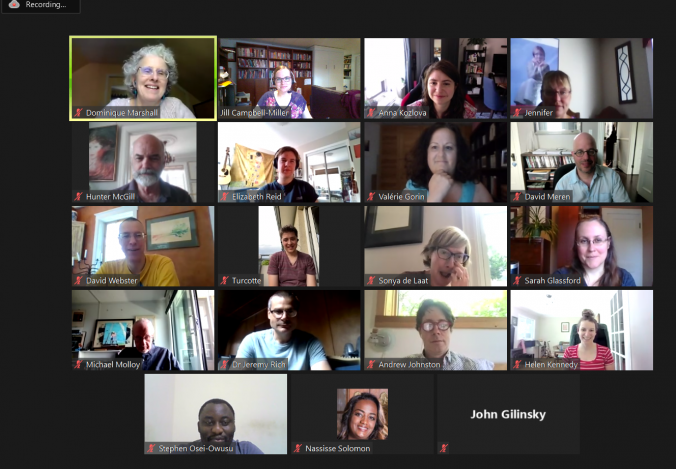by Anna Kozlova
Due to the ongoing COVID-19 pandemic, the Canadian Network of Humanitarian History’s (CNHH) seventh annual meeting was held virtually through the video conferencing platform Zoom. The virtual format of this year’s meeting resulted in a record high turnout with a number of overseas partners joining the meeting, demonstrating one of the rare benefits of the pandemic.
This was noted during the planning for the Canadian Historical Association’s (CHA) 2022 conference, where the goal is to have an Africa-centred panel as there has never been an area-focused panel focusing on development aid and humanitarianism in Africa. Organizers of the panel are considering the possibility of having a partially virtual format as that would allow for greater participation.
In spite of the pandemic, the past year has been a productive one for CNHH members. During the meeting, updates were provided on two MITACS-funded projects, Two case studies in the public history of international development policies in Canada: the Lebanese Special Measures Program (1975-1990) and The Life of Lewis Perinbam (1925-2008) and Micro-Histories of Transnational Humanitarian Aid: Co-Creation of Knowledge, Policy, and Education Materials. David Webster, Professor of History at Bishop’s University, talked about the digital initiatives that he is involved in which include launching a website inquiry on the history of Canadian development assistance, the Timor-Leste International Solidarity Archive and History Beyond Borders, which publishes e-dossiers on international history. Dominique Marshall, Professor of History at Carleton University, talked about her continued work with Archival Rescue on which is she working with alongside Hunter McGill, Senior Fellow at the School of International Development and Global Studies at the University of Ottawa, and Chris Trainor, Head Archivist at Carleton University.
Digital media was central to a lot of the discussions that took place during the meeting. Dominique has recently collaborated with Nicolas Lépine, an Associate Professor of History at Lakehead University on Recipro – a collaborative teaching website, meanwhile, Jill undertook the important role of overhauling and modernizing CNHH’s website, which is currently seeking blog contributions.
In terms of future projects, suggestions for a larger, more comprehensive project that explores the history of Canadian development efforts and a project focusing on visual histories were discussed. Under normal circumstances, CNHH tries to partner with local NGOs from the region where the annual meeting is being held, however, with the current remote environment, any NGOs, regardless of their location, are welcome to collaborate. Sarah Glassford, an archivist at the University of Windsor, talked about the value of establishing connections with NGOs as these connections often become long-term partnerships.
This meeting served as a wonderful example of the ability to productively adapt to the turbulent times we are currently living in. Throughout the discussions taking place at this meeting, CNHH members demonstrated the many ways that our current remote and digital environment has helped to eradicate some barriers to participation and collaboration, bringing the development community closer together.
__________________________________________________________________________________________
Anna Kozlova is a PhD Candidate in the Department of History at Carleton University. She was the lead researcher on the MITACS-funded project “Two case studies in the public history of international development policies in Canada: the Lebanese Special Measures Program (1975-1990) and The Life of Lewis Perinbam (1925-2008).”



